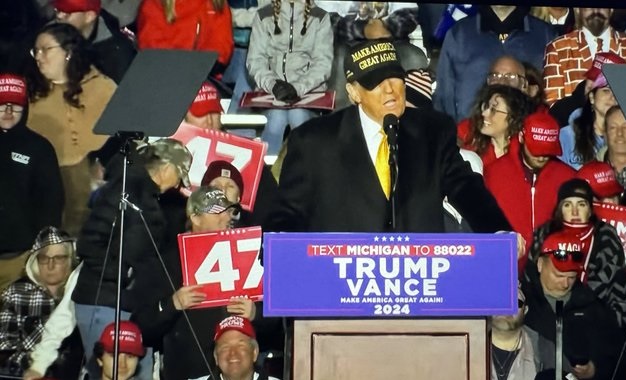At a recent rally, former President Donald Trump made a striking statement regarding Vice President Kamala Harris, suggesting that her potential presidency would put the nation at risk of entering World War III. Trump characterized Harris’s competency as grossly inadequate for a position of such responsibility, expressing concern that under her leadership, military drafts could be necessary, leading to the involvement of countless American families in “never-ending wars.” This strong rhetoric was part of Trump’s broader campaign message as he positions himself as a safer alternative for American international relations. By utilizing stark warnings about global conflict, he sought to raise alarm among voters regarding the implications of Harris’s potential leadership.
Furthermore, Trump emphasized the significance of his endorsement by a coalition of Muslim and Arab leaders at the rally. Their support seemed to underscore a considerable political strategy aimed at building a diverse base for his campaign. The leaders expressed their backing by highlighting Trump’s promises of promoting peace in conflict areas such as the Middle East and Ukraine. According to them, Trump’s administration would seek to avoid the escalation of conflicts rather than engage in them, positioning him as a stabilizing figure in a tumultuous political landscape. This marked a notable pivot in Trump’s outreach tactics, aiming to paint his candidacy not only as patriotic but also as appealing to various communities traditionally marginalized in right-wing politics.
Trump’s assertions extended to the context of recent geopolitical events, particularly the October 7th attack in Israel. He suggested that such incidents would not have occurred under his administration, directly linking his foreign policy approaches to stability in the region. The implication was clear: Trump believed his leadership style would prevent violence and upheaval, contrasting sharply with what he suggested would be Harris’s warmongering approach. This rhetoric is designed to resonate not just with conservative voters who are skeptical of military engagement, but also with the broader electorate who may be increasingly fatigued by protracted conflicts.
In addition to discussing foreign policy, Trump also touched on issues surrounding education and family values. He articulated a strong commitment to protecting children’s welfare, especially in terms of school curriculums. By framing his campaign around family-centric values, Trump aimed to connect with voters on a personal level, reinforcing an image of himself as a candidate who prioritizes their concerns. The endorsement from Muslim leaders emphasized their belief in Trump’s commitment to these values, illustrating an unexpected alignment that he likely hopes will broaden his appeal among different voter demographics.
Moreover, Trump used criticisms of Harris to further solidify his narrative of being the more stable and competent choice. He labeled her campaigning alongside Liz Cheney, whom he described as a “Muslim-hating warmonger,” as a significant liability. His comments aimed to not only discredit Harris but also to create a clear dichotomy of choice for voters—between what he characterized as a peaceful, stable administration under his leadership versus what he frames as Harris’s chaotic and aggressive potential. This tactic is a cunning campaign strategy, effective in stoking fears while reinforcing his message of a strong-arm approach to leadership.
In summary, Trump’s recent rally illustrated his assertive approach to the upcoming presidential election, emphasizing national security concerns, foreign policy stability, and traditional family values. The endorsements from Muslim and Arab leaders served to amplify his narrative of peace over conflict, despite his aggressive rhetoric against Harris. By constructing a clear narrative of potential dangers posed by a Harris presidency, he sought to rally his base and attract undecided voters. As the election approaches, these speeches will likely serve as critical moments in shaping voter sentiment and defining his campaign’s themes.

